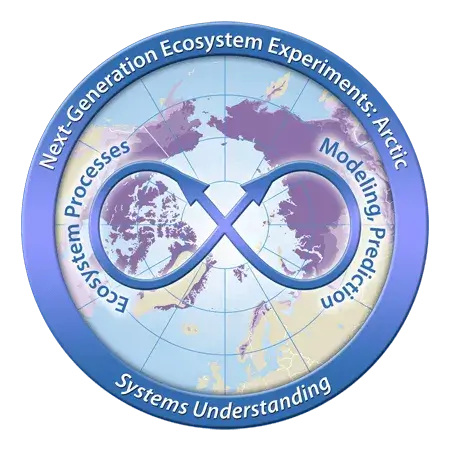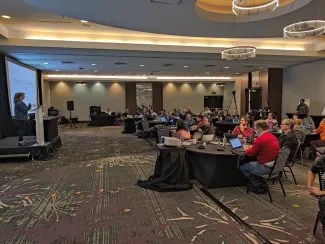NGEE Arctic scientists developed and led a successful workshop in which experimentalists from NGEE Arctic and other Environmental System Science (ESS) projects ran the E3SM Land Model (ELM).
Close interactions between empiricists and modelers are critical for closing the model-experiment (ModEx) loop, but empiricists often lack opportunities for hands-on experience with the models used in ESS research. To address this issue, a team of NGEE Arctic investigators organized a field-to-model workshop this October to give empiricists direct experience with ELM. In preparation for the workshop, the team created a containerized version of ELM that participants could easily operate on their personal computers. Workshop participants installed ELM on their computers, ran their own simulations of NGEE Arctic field sites, and visualized their results using the user-friendly workflow developed for the workshop. The workshop also included presentations and discussions on the structure of ELM as well as key data sets and strategies for running ELM at other sites. Participants performed model experiments that included changes in temperature and key model parameters (e.g., leaf photosynthetic traits, soil physical properties) and then compared ELM output with observational data sets.
The 2-day workshop included 45 in-person participants representing 6 national laboratories—Oak Ridge National Laboratory, Brookhaven National Laboratory, LANL, Argonne National Laboratory, Pacific Northwest National Laboratory, and Lawrence Berkeley National Laboratory—and multiple ESS-funded projects, including Science Focus Areas; NGEE Tropics; and Coastal Observations, Mechanisms, and Predictions Across Systems and Scales (COMPASS), along with NGEE Arctic. With its hybrid format, this workshop was also able to include remote participants, as well as participants from projects outside of NGEE Arctic thanks to support from the Office of Biological and Environmental Research’s ESS program. All participants successfully ran ELM on their computers. Feedback was overwhelmingly positive, and participants reported that they had increased their comfort and familiarity with ELM and improved their understandings of how empirical data can be used to inform model parameters, evaluation, and configurations for their projects and sites. The workshop established a foundation for future ModEx interactions, and plans are in development for sharing training resources, incorporating these tools into future research, and holding future versions of this training activity.
For more information, please contact:
Benjamin Sulman
sulmanbn@ornl.gov

